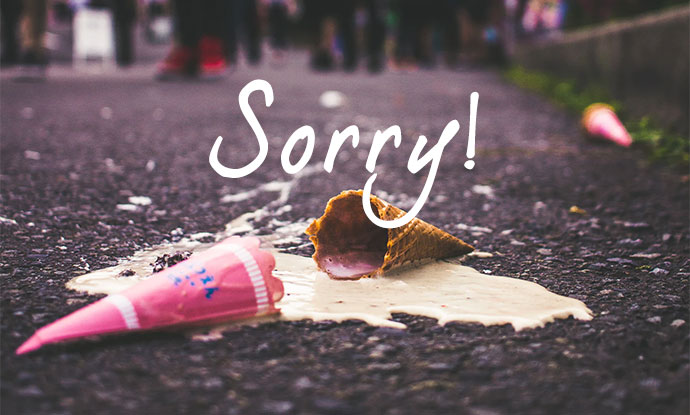“Wait… did I just hear you apologise to the wall when you hit your elbow just now?”
I asked a client this in a session, as we were chatting about why she was there that day.
The answer is yes, she did!
Honestly though, she’s not alone in this practice
I used to say sorry like this, too. I know a lot of other people also have this habit.
I’ve witnessed people walk into the same room as each other and say sorry?!
Sorry… I walked into the same room as you.
I walked within a close radius of where you’re walking or standing. Ooops. Sorry.
When you’re sitting back, reflecting about this behaviour… it doesn’t make sense does it?
And yet, more often than not we say sorry even though there’s NOTHING to be sorry about
Sorry for taking up space.
Sorry for existing.
Sorry, because you might be offended somehow.
Even though I’m not sure how you’d be offended, I’ll apologise just in case.
When you’re constantly saying sorry to the world around you, what does it mean about your inner world?
It could be a few different things, such as…
1. Your compassion and empathy radar might be way too open
For those who feel the feelings of others, saying sorry might be a response to what you’re picking up. Which is a sign that you need to learn some empath skills to tone down the signals you’re collecting from other people.
Because if nothing else, it isn’t good for your nervous system to be so wide open all the time.
2. Perhaps you’ve never learned boundaries?
But you sure have learned that people pleasing is a way to manage your lack of boundaries. Keep others happy and things will be okay in your world.
However, this means you mightn’t ever feel comfortable speaking up, and saying what you really mean.
If you’re someone who cares more about keeping the peace than asserting yourself, you might be apologising to keep things pleasant.
Except… same as above. Eventually you WILL care about not saying what’s true for you. By then, you might be frustrated that you don’t know how to get what you want!
3. You might’ve grown up in an environment where blaming someone for an incident was the “norm”
And as a child you might have assimilated this idea of blame.
Blaming yourself or others for everything that happens is a defense mechanism. As long as someone is feeling bad and remorseful, everything will be okay, right?
Not really, actually. Blame isn’t productive. It keeps the person doing the blaming feeling righteous, and the person being blamed feeling like crap. When the truth is, we’re all responsible for our own actions. Blaming someone else is a way to shift responsibility and in order to truly own our own stuff, we need to reflect inwards, not out to others.
4. Finally, one more possibility behind “sorry syndrome”… anxiety
Oh my. Anxiety exaggerates EVERYTHING. Right? Your feeling about how someone else has perceived your words or actions might be totally out of proportion. In your mind it’s a disaster. But someone else mightn’t give what happened a second thought.
So here’s the thing. Once you notice you’re always apologising for everything, you CAN resolve do something about it. Awareness comes first!
Notice the circumstances where you’re more inclined to say sorry for things
And as you open your mouth to say sorry, try taking a long slow deep breath instead.
Just give yourself a moment, and check in… is there a need to say sorry for something, or not?
If not, once you’ve finished taking your in-breath, exhale and smile at the person who would’ve received your apology.
You might want to examine your self-worth, and your beliefs
Is it okay for you to even take up space? Is it safe to be seen or heard?
If you feel like the answer is no, then you’ve got some work to do.
Because all of us have exactly the same right to be here.
Once you boost your self-worth factor, and learn to calm down your “sorry trigger finger”, you might find that it’s okay to simply walk into a room and radiate your uniqueness.
No apologies required.
Much love,

 |
Ambha Amanda Roberts is a Kinesiologist, Intuitive Healer, educator and facilitator based on the Sunshine Coast, Australia. She offers Kinesiology sessions both in-person and via Skype/Zoom all over the world. Ambha Amanda is the co-creator of Adventures of Staria, which includes a series of Staria cards, and an upcoming book for children (including inner children). |


